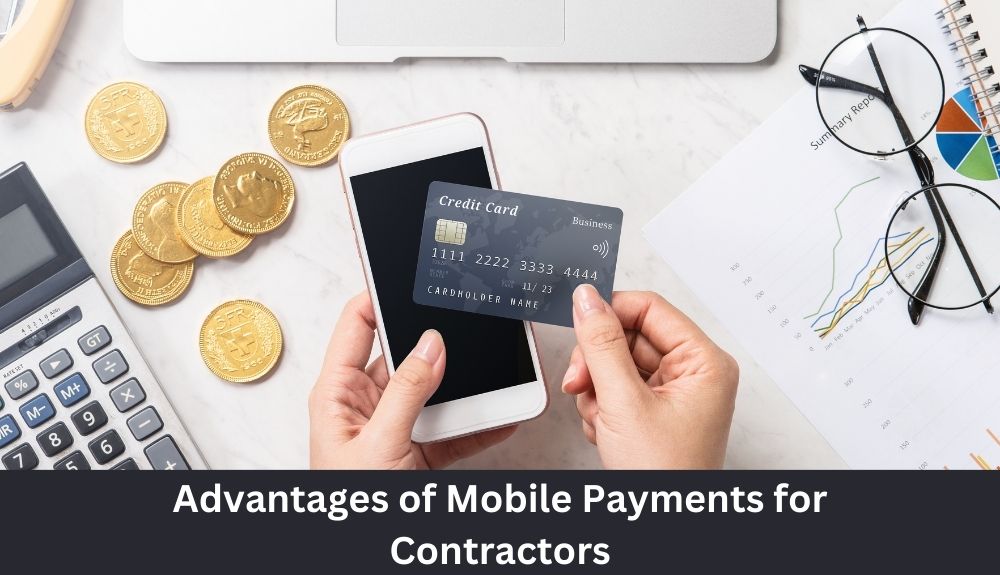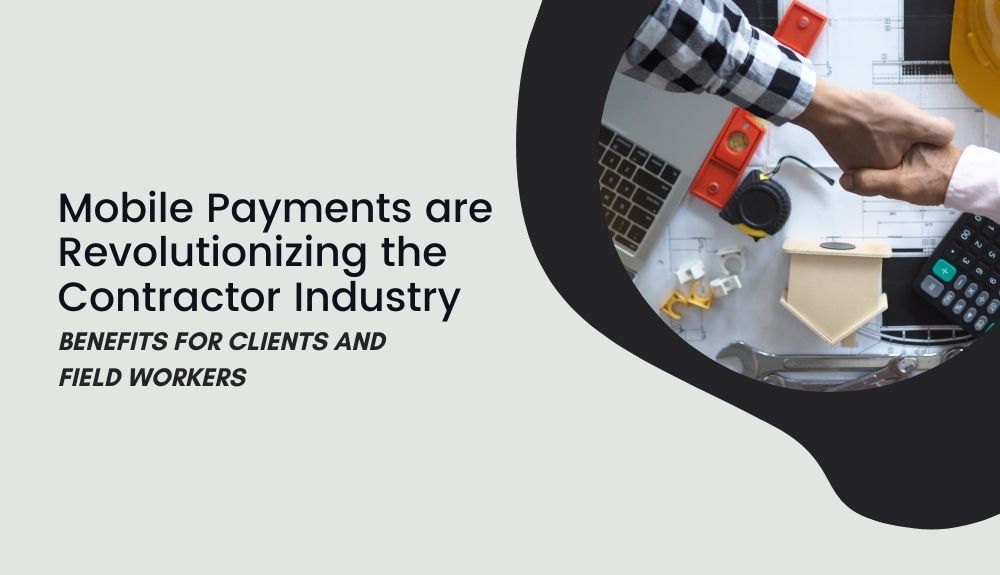Are you tired of the hassle of cash payments and the inefficiencies of traditional payment methods in the contractor industry? Look no further! Mobile payments are here to revolutionize the way financial transactions are conducted in this sector.
Imagine this scenario: a contractor completes a project, and instead of waiting weeks for a client to write a check or handling stacks of cash, the payment is processed instantly through their mobile device. Sounds convenient, right? But the benefits of mobile payments extend far beyond just convenience.
In this blog, we will delve into how mobile payments are transforming the contractor industry, benefiting both clients and field workers. We will explore the advantages of embracing mobile payments, including streamlined financial processes, improved cash flow, enhanced customer experiences, and better inventory management. By adopting mobile payment solutions, contractors can increase customer satisfaction, simplify their supply chain infrastructure, and stay ahead in today’s fast-paced digital world.
Get ready to unlock the potential of mobile payments and take your contractor business to new heights of efficiency and success!
Introduction to Embracing Mobile Payments in the Contractor Industry
Mobile payments have revolutionized various industries, and the contractor industry is no exception. Embracing mobile payment solutions brings a range of benefits for both clients and field workers, streamlining financial transactions and providing greater convenience.
In today’s fast-paced digital world, mobile payments have become an essential tool for contractors. With the widespread use of smartphones, it is now easier than ever to process payments securely and efficiently. As a result, contractors can enhance their business operations and improve customer satisfaction by offering the flexibility and convenience of mobile payment options.
For clients, mobile payments provide a seamless transaction experience. Instead of relying on traditional methods, such as cash or checks, clients can make timely payments using their preferred mobile payment app. This eliminates the hassle of carrying physical currency and simplifies the payment process, ensuring faster transactions and a better overall customer experience.
Field workers also benefit from mobile payments. With the ability to accept payments on the go, they can receive timely payment for their services, eliminating the need for manual invoicing or delayed payments. Mobile payments help streamline the financial processes within the contractor industry, ensuring faster and more secure transactions.
In summary, embracing mobile payments in the contractor industry brings numerous advantages. It simplifies the payment process for clients, improves cash flow management for field workers, and ultimately leads to happier customers and more efficient business operations. As mobile payment technology continues to evolve, it is crucial for contractors to stay ahead of the curve and adopt this innovative approach to financial transactions.
The Growing Trend of Mobile Payments
In recent years, mobile payments have witnessed a significant surge in adoption across various industries, including the construction and contractor businesses. With the increasing reliance on smartphones and evolving payment technologies, more contractors are embracing mobile payment options to streamline financial transactions and enhance overall efficiency.
Advantages of Mobile Payments for Contractors

1. Faster and Convenient Transactions: Mobile payments allow contractors to accept payments on-the-go, eliminating the need for traditional payment methods like cash or checks. By simply tapping their smartphones or using mobile card readers, contractors can process transactions swiftly, reducing waiting times and enhancing customer satisfaction.
2. Increased Security: Mobile payment systems offer robust security features, including encryption and tokenization, ensuring that transactions remain secure and protected from fraud or theft. This instills trust among clients and promotes a secure payment environment for all parties involved.
3. Flexibility and Mobility: Mobile payment solutions enable contractors to accept payments remotely, whether they are at a client’s location or on a construction site. This flexibility eliminates the constraints of physical payment processing and enables contractors to offer convenient payment options to their clients.
4. Improved Cash Flow: By embracing mobile payments, contractors can optimize their cash flow management. With faster payment processing and reduced reliance on traditional paper-based methods, contractors can receive timely payments, improving their financial stability and liquidity.
5. Enhanced Efficiency: Mobile payments streamline the payment process, eliminating manual data entry and paperwork. This reduces administrative burdens, allowing contractors to focus on their core operations and deliver projects more efficiently.
The potential for growth in the adoption of mobile payments within the contractor industry is immense. As technology continues to advance and consumers increasingly embrace mobile payment options, contractors who embrace this trend can gain a competitive edge and cater to the evolving needs of their clients.
Advantages of Mobile Payments for Contractors
In the contractor industry, embracing mobile payments offers numerous advantages that can revolutionize the way business is conducted. Here are some key benefits that contractors can reap from implementing mobile payment solutions:
1. Faster Transactions
With mobile payments, contractors can say goodbye to time-consuming manual payment processes. By utilizing mobile payment systems, contractors can accept payments instantly, eliminating the need for paper-based systems and reducing the time spent on administrative tasks. This increased efficiency allows contractors to focus more on their core operations and deliver services promptly.
2. Increased Security
Traditional payment methods often involve the risk of handling cash or sensitive financial information. On the other hand, mobile payment solutions offer enhanced security measures such as encryption and tokenization of data, reducing the risk of fraud or theft. By providing a secure platform for monetary transactions, contractors can keep their clients’ financial information safe and build trust in their services.
3. Flexibility and Convenience
Mobile payment options provide convenience for both clients and field workers. Contractors can accept payments from clients on-site, eliminating the need for invoicing and delayed payment collection. This flexibility allows contractors to address any financial transactions promptly, improving cash flow management and boosting overall productivity. Additionally, clients benefit from the ease of making payments through their mobile devices, making the overall transaction process more seamless and satisfactory.
4. Improved Cash Flow
Timely payments are crucial for contractors to maintain a healthy cash flow. Mobile payment solutions streamline the payment collection process, reducing delays and ensuring contractors receive payments on time. This improved cash flow enables contractors to meet operational expenses promptly and invest in business growth opportunities.
In conclusion, mobile payments offer significant advantages for contractors in the form of faster transactions, increased security, flexibility, and improved cash flow. By embracing mobile payment solutions, contractors can enhance their efficiency, provide a seamless payment experience for clients, and ultimately achieve greater customer satisfaction. The adoption of mobile payments in the contractor industry is a smart move that can lead to long-term growth and success.
Implementation of Mobile Payment Systems in the Contractor Industry
Integrating mobile payment systems into contractor businesses can significantly streamline financial transactions and enhance operational efficiency. Here are the key steps involved in implementing mobile payment systems for contractors:
1. Assess Your Business Needs and Goals
Before selecting a mobile payment solution, assess your specific requirements and goals. Consider factors such as transaction volume, types of services provided, and the preferred payment methods of your clients. This evaluation will help you choose the most suitable payment system for your business.
2. Research and Choose the Right Payment Solution
Research different mobile payment solutions available in the market and compare their features, costs, and compatibility with your existing systems. Look for solutions that offer secure payment processing, easy integration, and user-friendly interfaces. Consider factors like transaction fees, contract terms, customer support, and any additional features that may benefit your business.
3. Integrate with Existing Systems
Ensure smooth integration of the mobile payment system with your existing tools and software. This might involve working closely with your IT department or hiring external experts for assistance. Integration will allow you to seamlessly sync customer information, transaction history, and other relevant data between different systems, eliminating the need for manual data entry.
4. Train Employees and Educate Clients
Train your employees on how to operate and troubleshoot the mobile payment system effectively. Provide comprehensive training sessions to ensure they understand its features, security protocols, and any specific processes or guidelines. Additionally, educate your clients about the benefits of using the mobile payment option and provide clear instructions on how to make payments using the new system.
5. Test and Optimize the System
Before full implementation, conduct extensive testing to ensure the mobile payment system functions flawlessly. Test various scenarios, including different payment methods, transaction volumes, and device compatibility. Address any issues or glitches that arise promptly. Regularly monitor system performance and gather feedback from clients and employees to identify areas for improvement.
By following these steps, contractors can successfully implement mobile payment systems into their businesses, simplifying financial transactions and enhancing overall operational efficiency. Embracing mobile payments not only offers convenience for clients and field workers but also ensures faster and more secure transactions, improved cash flow management, and increased customer satisfaction.
Best Practices for Successful Mobile Payment Adoption
Embracing mobile payments in the contractor industry can bring numerous benefits, but successful adoption requires careful planning and implementation. Here are some best practices to help contractors effectively embrace mobile payments:
1. Educate Clients and Field Workers
One of the key steps in adopting mobile payments is educating clients and field workers about the benefits and process. Provide clear and concise information about how mobile payments work, the security measures in place, and the convenience it offers. Regularly communicate with clients to answer any questions and address any concerns they may have.
2. Promote Mobile Payment Options
Make sure clients are aware of the option to make payments via mobile devices. Highlight the convenience, speed, and flexibility it provides. Use various channels such as email newsletters and social media to educate and promote these payment options. Include persuasive messaging that emphasizes the benefits of mobile payments and encourages clients to make the switch.
3. Ensure Compatibility and Integration
Choose a mobile payment solution that integrates well with your existing systems and processes. Ensure compatibility with your customer relationship management (CRM) software, inventory management system, and other essential tools. Seamless integration will streamline the payment process and reduce the chances of errors or discrepancies.
4. Address Security Concerns
Security is a critical consideration when adopting mobile payments. Choose a mobile payment solution that provides robust encryption and data protection. Communicate the security measures to clients and assure them of a safe and secure transaction process. Display trust seals and certifications on your website to enhance customer confidence in using mobile payments.
5. Offer Multiple Payment Options
To accommodate various preferences, provide multiple mobile payment options to clients. This could include digital wallets, QR code payments, or contactless payment methods. Giving clients the flexibility to choose the method that suits them best increases the likelihood of adoption and customer satisfaction.
6. Streamline the Onboarding Process
Make the onboarding process as smooth as possible. Simplify the registration and setup procedures for clients and field workers. Offer step-by-step guidance and support, and ensure that the mobile payment app or platform is user-friendly and intuitive.
7. Provide Ongoing Support
Offer ongoing support for clients and field workers using mobile payments. Be responsive to inquiries and technical issues promptly. Provide resources such as tutorials, FAQs, and dedicated customer support to assist users in maximizing the benefits of mobile payments.
By following these best practices, contractors can successfully adopt mobile payments, enhancing convenience for both clients and field workers while streamlining financial transactions. This strategic move can improve customer satisfaction, boost efficiency, and contribute to the growth of the contractor industry in today’s fast-paced digital world.
Future Trends and Innovations in Mobile Payments for Contractors

As technology continues to advance, the future of mobile payments in the contractor industry looks promising. Contractors and construction businesses can benefit from staying up-to-date with the latest trends and innovations in mobile payment systems. Let’s explore some key areas to watch out for in the coming years:
Blockchain Technology
Blockchain technology, often associated with cryptocurrencies like Bitcoin, has the potential to revolutionize mobile payments for contractors. By leveraging blockchain’s decentralized and secure nature, transactions can be executed with transparency and immutability. Contractors can enjoy faster and more secure payment processes, reducing the risk of fraud and disputes.
Virtual Reality Integration
Virtual reality (VR) is not just for gaming and entertainment – it can also play a role in contractor mobile payments. Imagine a scenario where field workers can use VR headsets to virtually inspect projects, approve tasks, and initiate payment transactions seamlessly. VR integration can enhance the efficiency and accuracy of mobile payments, minimizing errors and delays.
Artificial Intelligence for Streamlined Payments
Artificial intelligence (AI) algorithms can automate payment processes and provide intelligent insights to contractors. AI-powered mobile payment systems can analyze patterns, detect anomalies, and facilitate predictive analytics. Contractors can benefit from faster and more accurate payment reconciliation, improved cash flow management, and enhanced risk assessment.
Enhanced Mobile Payment Apps
Mobile payment apps are constantly evolving to provide better user experiences and additional features. Contractors can expect more intuitive interfaces, enhanced security measures, and seamless integration with other business tools. Features like instant invoicing, receipt management, and real-time transaction tracking can further streamline financial processes for contractors.
Contactless and Biometric Payments
Contactless payment methods, such as Near Field Communication (NFC) and QR codes, have gained significant popularity in recent years. Contractors can leverage these technologies to accept payments from clients and field workers without physical contact, ensuring a more hygienic and convenient payment experience. Biometric authentication, such as fingerprint or facial recognition, adds an extra layer of security to transactions.
Embracing these future trends and innovations in mobile payments can position contractors at the forefront of the industry. By staying informed and adopting the latest technologies, contractors can enhance efficiency, improve customer satisfaction, and stay ahead of the competition. It’s an exciting time for the contractor industry as mobile payments continue to transform the way financial transactions are conducted.
Remember, the future is bright, and contractors who embrace these emerging trends will be well-equipped to thrive in the ever-evolving landscape of mobile payments.
Conclusion
In conclusion, the widespread adoption of mobile payments in the contractor industry has brought about numerous benefits for both clients and field workers. Embracing mobile payments offers enhanced convenience, increased customer satisfaction, and streamlined financial processes.
By adopting mobile payment solutions, contractors can enjoy faster transactions, ensuring timely payments and improved cash flow. The flexibility of mobile payments allows for secure cross-border transactions, enabling contractors to accept payments from clients worldwide. The security features of mobile payment systems provide peace of mind for contractors and their clients.
Moreover, the convenience of mobile payments simplifies the supply chain infrastructure, allowing for better inventory management and more efficient payment collection. This not only improves overall efficiency but also leads to happier customers and better customer support.
As the construction industry continues to evolve in today’s fast-paced digital world, embracing mobile payments is essential for remaining competitive and meeting customer expectations. Contractors who adopt mobile payment systems position themselves for growth and success.
In conclusion, by leveraging the benefits of mobile payments, contractors can enhance convenience, customer satisfaction, and their overall business operations. Embracing this innovative approach is crucial in the ever-evolving payment landscape, paving the way for a successful future in the contractor industry.
